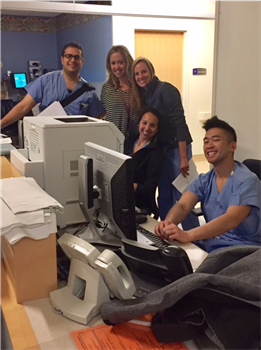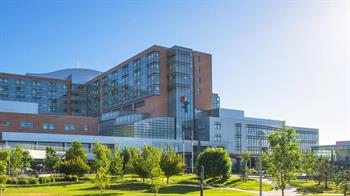Fellowship Curriculum
Department of Otolaryngology - Head & Neck Surgery
Each pediatric otolaryngology fellow has clinical responsibilities during the entire year, including clinical activities in the operating room, examination of patients in the outpatient department, examination of inpatient consultations, participation in morning ward rounds, on-call responsibilities, and teaching rounds. There is a particular emphasis on the complete longitudinal care of the pediatric patient with otolaryngologic disorders, from the initial consultation in the emergency room or outpatient clinic through any operative intervention to appropriate outpatient follow up.
As there is always an attending pediatric otolaryngologist present,
the large patient population allows for continuous teaching of the pediatric otolaryngology fellow in the outpatient department, operating
room and rounds on the wards as well as during formal teaching sessions.
pediatric otolaryngology fellow in the outpatient department, operating
room and rounds on the wards as well as during formal teaching sessions.
The weekday rotations are set to maximize the learning experience of the pediatric otolaryngology fellow. Clinically, the fellow splits time between the operating rooms and clinics (general pediatric otolaryngology clinics, as well as the many multidisciplinary clinics, which include Cleft/Craniofacial, Hearing, Sinus, Vascular Malformation, Sleep, and Voice). The fellow is also given two half-days of protected time every week for research and reading. The schedule allows flexibility to maximize the fellow’s educational experience.
The fellow rotates between the different attending pediatric otolaryngologists. Although each faculty is capable of practicing the entire spectrum of clinical pediatric otolaryngology, special interest and training distinguish the faculty among themselves. Therefore, rotation among the faculty gives the pediatric otolaryngology fellow exposure to a very extensive variety of clinical problems and surgical procedures, and also exposes the fellow to many different approaches to the same problem.
In the pediatric otolaryngology clinic, a full-time pediatric otolaryngologist is responsible for the clinical care and teaching of the pediatric otolaryngology fellow and otolaryngology resident, who obtain the history and examine the patient and based on these data, formulate a preliminary treatment plan. The patient is then presented to and examined by the attending pediatric otolaryngologist, who discusses management and treatment options of the patient with the resident and finalizes the treatment plan.
In the operating room there is always one or more attending pediatric otolaryngologist for clinical care, supervision and teaching of the pediatric otolaryngology fellow and the otolaryngology resident. No patient can be taken to the operating room, during regular hours as well as during night-time or week-end calls, without an attending pediatric otolaryngologist being present in the operating room except for extreme emergencies. The attending surgeon, pediatric otolaryngology fellow and otolaryngology resident also make rounds on all post-operative patients after the operative schedule has been completed.
The Department of Pediatric Otolaryngology regularly accepts 3rd and 4th year medical students from the University of Colorado School of Medicine. In addition to their own education, fellows are partly responsible for educating medical students, as well as junior residents rotating through the various clinical services. There is ample opportunity for educational interaction in the outpatient clinic, inpatient wards, the emergency department and the operating room in an informal basis. This remains an important function of the fellow, as these students and residents participate in departmental conferences and grand rounds.
The weekly work round will be coordinated alternately by the fellow and the senior otolaryngology resident. The main objective is to review the current patient roster and discuss the upcoming cases of the week with the emphasis on case assignment.
Block Diagram of Otolaryngology Educational Program
Pediatric Otolaryngology Fellow

 residency program, and will act as a liaison between the
otolaryngology residents and the faculty. The fellow will share in the
entire clinical load (in-patient rounding, out-patient department and
consults) of the service with emphasis on teaching and supervising
residents and medical students as a progressive responsibility during
the training period. Specifically, the surgical caseload will be divided
with the senior resident such that the pediatric otolaryngology fellow
either is the surgeon on the most difficult cases or as the teaching
assistant on less difficult cases. The distribution of surgical cases
will be resolved every Monday morning during the Pediatric
Otolaryngology Conference between the pediatric otolaryngology fellow
and the PGY4 resident with faculty input. Caseload distribution will be
closely monitored to ensure that fellows receive exposure to the breadth
of discourse and perform procedures required and appropriate to the
program objectives.
residency program, and will act as a liaison between the
otolaryngology residents and the faculty. The fellow will share in the
entire clinical load (in-patient rounding, out-patient department and
consults) of the service with emphasis on teaching and supervising
residents and medical students as a progressive responsibility during
the training period. Specifically, the surgical caseload will be divided
with the senior resident such that the pediatric otolaryngology fellow
either is the surgeon on the most difficult cases or as the teaching
assistant on less difficult cases. The distribution of surgical cases
will be resolved every Monday morning during the Pediatric
Otolaryngology Conference between the pediatric otolaryngology fellow
and the PGY4 resident with faculty input. Caseload distribution will be
closely monitored to ensure that fellows receive exposure to the breadth
of discourse and perform procedures required and appropriate to the
program objectives.The Program Director will be in charge of the weekly Pediatric Otolaryngology Conference. It will consist of two (2) presentations per month, by either the pediatric otolaryngology faculty or affiliated CHCO clinicians or staff (MDs, PhDs or AuDs). The pediatric otolaryngology fellow will be responsible for the presentation of one (1) topic per month. The remaining talks will be case presentations coordinated by the fellow and presented by the otolaryngology residents and the program director. The remaining conferences take place at the University of Colorado School of Medicine. Both the Pediatric Grand Rounds (quarterly) and Quality Improvement and Patient Safety conference (monthly) will be a shared responsibility between the pediatric otolaryngology fellows and otolaryngology residents.
Lectures are on a yearly rotation and are comprised of more clinically relevant topics that have application in the daily duties of the pediatric otolaryngology fellow. Additional conferences that supplement this basic science curriculum will include radiology conference, pediatric tumor board, facial trauma conference, morbidity and mortality conference, and grand rounds lectures.
| Conference | Site | Time | Leader |
| Pediatric Otolaryngology Conference | CHCO | Mondays 7-8am | Program Director & Peds OTO Fellow |
| Pediatric Work Rounds | CHCO | Mondays 8-8:30am | Peds OTO Fellow |
| Otolaryngology Grand Rounds - Pediatrics | CHCO | Quarterly Thursdays 7-8am | Peds OTO Fellow & OTO Residents |
| Quality Improvement and Patient Safety | SOM | 2nd Thursdays 7-8am | Peds OTO Fellow & OTO Residents |
| Pediatric Otolaryngology Journal Club | SOM | Bi-Monthly 7-9pm | Peds OTO Fellow & Peds Faculty |
| Departmental Temporal Bone Dissection Course | SOM | 1 Week Annually 8am-5pm | Dr. Stephen Cass |
All the above conferences are mandatory for the pediatric otolaryngology fellow to attend and records of attendance are maintained. The fellow will be given protected time free of clinical responsibility during the conferences. Furthermore, there is protected time during the work week to prepare for these conferences.
The didactic lectures for pediatric otolaryngology will occur every Monday morning. Faculty lectures will be focused on the entire spectrum of pediatric otolaryngology. Invited speakers will come from cross-specialties such as audiology, speech/language disorder, pulmonology, gastroenterology, radiology, pathology and anesthesiology. Clinicians with special clinical research skills will also be asked to speak on research methodology. In addition, the pediatric otolaryngology fellow is required to attend the Department of Otolaryngology Grand Rounds which focus on a pediatric otolaryngology topic quarterly. The Department of Otolaryngology also provides an annual temporal bone dissection course that the pediatric otolaryngology fellow will attend.
The clinical education is less formal and is comprised of teaching on a variety of topics both while in the operating room and in the clinic, including the inter-disciplinary clinics (Sinus, Hearing, Cleft Palate, Voice, Vascular Malformation, and Sleep). The pediatric otolaryngology fellow also is expected to attend monthly departmental-wide morbidity and mortality conferences and bi-monthly pediatric otolaryngology grand rounds. Fellows are encouraged to attend all other relevant weekly departmental conferences geared toward the otolaryngology residents (e.g. head and neck tumor board, radiology conference and other non-pediatric grand rounds).
Quality Improvement and Patient Safety Conferences
Monthly quality improvement conferences are held in the Department of Otolaryngology at the University of Colorado School of Medicine and is used to discuss patient care issues in relationship to outcome measures. This quality improvement conference provides experiential learning for system errors. Complications are presented by the fellow or resident surgeon who participated, with the attending surgeon present. The fellow is expected to present, research, and understand the literature related to their individual complications. The fellow also should understand the impact and the system’s contribution to the complication and follow the Healthcare Matrix model for one to two cases a month.
Tumor Board Conferences
A multi-disciplinary tumor board occurs every Monday morning. This is a combined board for the University of Colorado Hospital, Denver Health Medical Center, and Veterans Affairs Medical Center. Outside private otolaryngologists also present cases. The residents present cases to the board. The pathology and radiology are reviewed by faculty from those areas and treatment issues are discussed among the surgeons, radiation oncologists, and medical oncologists. Additional dental prosthetics faculty and other faculty attend as needed.
Journal Club
The monthly Pediatric Otolaryngology Journal Club is organized by the pediatric otolaryngology fellow under the supervision of one of the pediatric faculty. It allows the faculty to informally teach the fellow how to evaluate medical literature.
There are local meetings and educational courses held on the campus that fellows are encouraged to participate in, including:
- Temporal Bone Course – Anschutz Medical Campus
- Otolaryngology & Neurosurgery Cadaver Lab – Anschutz Medical Campus
- Sinus Dissection Course – Anschutz Medical Campus
- The Ultimate Colorado Mid-Winter Otolaryngology Update Meeting